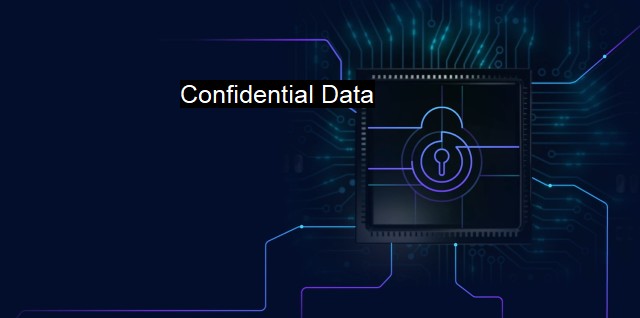What is Confidential Data?
Ensuring Confidential Data Safety: The Importance of Antivirus Software in Cybersecurity
Confidential data refers to sensitive information that is limited to authorized personnel only. According to cybersecurity principles, it is an essential type of data that is usually hidden from unauthorized individuals. The field of confidential data is vast, encompassing every type of data an organization aims to protect. It ranges from small descriptions, confidential emails, internal calculations, to client information, billing details, proprietary knowledge, business strategies, and much more.Confidential data is the lifeblood of every organization. It needs to be guarded from unauthorized access or malicious tampering. The consequences of such violations can be dire, costing an organization not just monetary losses but dampening its reputation, reducing customer trust, losing competitive advantage and, in severe cases, triggering lawsuits for non-compliance with data protection laws.
Preserving the confidentiality, integrity, and availability (CIA) of confidential data is the primary goal. Maintaining confidentiality involves ensuring that only authorized personnel can access the information. Cybersecurity measures like encryption, installing firewalls, using secure and complex passwords, managing user access permissions, and user authentication contribute to improved confidentiality.
One form of defense against attacks compromising confidential data is robust antivirus software. Antivirus software serves an important dual role. It not only combats incoming threats but also helps prevent sensitive data leakage. Modern antivirus solutions are equipped with the ability to detect threats proactively via real-time scanning. Finding, identifying, and quarantining malicious software before it can gain access to the system and confidential data is the process.
Antivirus software uses advanced features like behavior-based detection, which analyses the behavior of applications, files, and processes in real-time to detect and block abnormal behavior immediately. Many antivirus solutions in the market also incorporate firewall and VPN services for an extra layer of data protection and integrity.
The cybersecurity world is continually evolving. Innovative technologies such as AI (Artificial Intelligence) and machine learning are being utilized to improve cybersecurity measures and combat sophisticated threats. AI and machine learning algorithms don't rely only on signatures from known threats. They can detect harmful patterns that point to new viruses or malware anomalies.
Another area of concern in cybersecurity is the rising popularity of IoT (Internet of Things) devices. While these devices offer immense conveniences, they come with inherent security vulnerabilities. IoT devices usually manage a great deal of confidential data, making them prime targets for cyber attackers. Therefore, organizations have to take additional steps to safeguard these devices from compromise.
It is also necessary to have measures in place to recover data in the case of a breach. Advanced backup and recovery solutions safeguard data integrity. In the event of a data breach, system outage or natural disaster, organizations can restore their systems to their original state without loss of confidential data.
No matter the cybersecurity and antivirus measures in place, the human element cannot be overlooked. Employees need to be educated and regularly updated about the evolving threat landscape. Training should cover best practices for preserving confidential information such as regular password changes, identifying phishing attempts, and avoiding suspicious downloads or attachments.
Confidential data is critical and can be an organization's most important asset. Safeguarding it is not just a choice but a necessity. Effective cybersecurity measures, combined with robust antivirus software, ongoing employee training, AI and machine learning technologies, and honed procedures for backup and recovery, form a formidable defense against threats to confidential data.
Organizations' strategies need to be proactive, evolving, and comprehensive, addressing differing threats. It's vital to review and update these strategies regularly to effectively ensure the security of confidential data, thus protecting businesses and their stakeholders from harm related to data breaches.

Confidential Data FAQs
What is confidential data?
Confidential data is any information that is considered sensitive or privy to a particular organization or individual. This data can include financial information, personal information, trade secrets, and intellectual property.Why is protecting confidential data important?
Protecting confidential data is crucial because it helps prevent unauthorized access, theft, or malicious use of sensitive information. Any data breach can cause significant financial losses, reputational damage, and legal consequences.How can antivirus software help protect confidential data?
Antivirus software can help protect confidential data by detecting and removing malware or viruses that can compromise the security of the system. It can also prevent hackers from accessing sensitive information and monitor network traffic for any suspicious activity.What should I do to ensure the safety of my confidential data?
To ensure the safety of confidential data, you should implement strong cybersecurity measures, such as using antivirus software, firewalls, and encryption. It is also essential to limit access to sensitive information only to authorized personnel and regularly update passwords and software. Additionally, you should provide cybersecurity training for your staff and use secure networks to prevent any possible attacks.| | A | | | B | | | C | | | D | | | E | | | F | | | G | | | H | | | I | | | J | | | K | | | L | | | M | |
| | N | | | O | | | P | | | Q | | | R | | | S | | | T | | | U | | | V | | | W | | | X | | | Y | | | Z | |
| | 1 | | | 2 | | | 3 | | | 4 | | | 7 | | | 8 | | |||||||